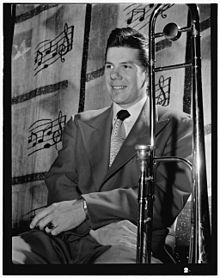Harry Betts
Harry Betts | |
|---|---|
 Betts, c. 1947 | |
| Background information | |
| Born | September 15, 1922 New York, U.S. |
| Died | July 13, 2012 (aged 89) |
| Genres | Jazz |
| Occupation(s) | Musician, arranger |
| Instrument | Trombone |
| Labels | Ava |
Harry Betts (15 September 1922 – 13 July 2012) was an American jazz trombonist.[1]
Background
Born in New York and raised in Fresno, California, he was active as a jazz trombonist and played with Stan Kenton's orchestra in the 1950s.[2] He can be heard on the album Get Happy! (Verve, 1959) by Ella Fitzgerald.
Music
He wrote and orchestrated soundtracks for several films, including A Swingin' Summer (1965), The Big Mouth (1967), A Time for Dying (1969), The Fantastic Plastic Machine (1969), Goodnight, My Love (1972), Black Mama White Mama (1972), Little Cigars (1973) and Nice Dreams (1981). Music from his score to Black Mama White Mama was used in the 2003 soundtrack for Kill Bill, Volume 1.
Aside from his work in scoring, he was known for his 1962 album, The Jazz Soul of Doctor Kildare. He did numerous arrangements for singer Jack Jones.[2]
Discography

This section needs expansion. You can help by adding to it. (October 2016) |
- The Jazz Soul of Dr. Kildare (Ava, 1962)
As sideman
With Elmer Bernstein
- "The Man with the Golden Arm" (Decca, 1956)
With Bobby Darin
- Venice Blue (Capitol)
With Fred Katz
- Folk Songs for Far Out Folk (Warner Bros., 1958)
With Stan Kenton
- Stan Kenton's Milestones (Capitol, 1943–47 [1950])
- Encores (Capitol, 1947)
- A Presentation of Progressive Jazz (Capitol, 1947)
- Innovations in Modern Music (Capitol, 1950)
- Stan Kenton Presents (Capitol, 1950)
- This Modern World (Capitol, 1953)
- The Kenton Era (Capitol, 1940–54, [1955])
- The Innovations Orchestra (Capitol, 1950–51 [1997])
With Barney Kessel
- Carmen (Contemporary, 1959)
With Shorty Rogers
- Cool and Crazy (RCA Victor, 1953)
- Shorty Rogers Courts the Count (RCA Victor, 1954)
- Jazz Waltz (Reprise, 1962)
With Pete Rugolo
- Introducing Pete Rugolo (Columbia, 1954)
- Adventures in Rhythm (Columbia, 1954)
- Rugolomania (Columbia, 1955)
- Rugolo Plays Kenton (EmArcy, 1958)
- 10 Trombones Like 2 Pianos (Mercury, 1960)
References
- ^ "Harry Betts Obituary". Los Angeles Times. 18 July 2012. Retrieved 24 November 2013.
- ^ a b Eder, Bruce. "Harry Betts". Allmusic. Retrieved 2010-01-03.
- 1922 births
- American film score composers
- Male film score composers
- American jazz trombonists
- Male trombonists
- Grammy Award winners
- American jazz bandleaders
- American jazz composers
- American male jazz composers
- American music arrangers
- 2012 deaths
- American composer, 20th-century birth stubs
- American jazz trombonist stubs
- American film biography stubs
